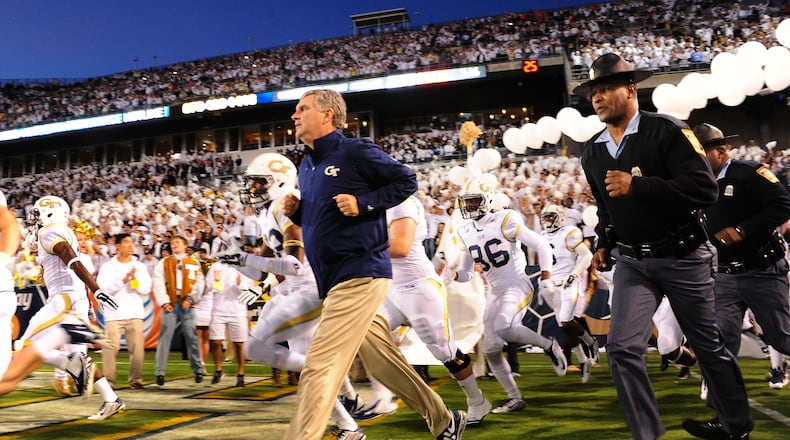As his career ascended to heights that few might have foreseen when he made the leap to take a job coaching the defensive line at Georgia Southern in 1983, Paul Johnson never doubted that his unorthodox offensive scheme would work at any level of competition. Skeptics believed otherwise.
“That’s what was frustrating, some stuff like that,” Johnson said Wednesday in a videoconference with media. “I never had any doubt the offense worked. We had proof out on the field by scoring and winning games and doing those kinds of things.”
Johnson’s virtual news conference was held for his selection to the College Football Hall of Fame’s Class of 2023. It is an honor that would seem to be a confirming final evaluation on Johnson’s 22-year head-coaching career at Georgia Southern, Navy and Georgia Tech and his spread-option attack.
“In my mind, it kind of validates your career, what you accomplished over that time frame at some different places,” Johnson said. “Just honored and excited to be in there. Not just for me, but for everybody else that was involved.”
Before Monday’s announcement, there had been plenty of validation already. As head coach at Georgia Southern, he won back-to-back FCS national championships (1999-2000). At Navy, he turned around a program that had a 1-20 record in the two seasons before his hire and put together a 43-19 record in his final five seasons, winning 11 consecutive games against rivals Air Force and Army. At Tech, he led the Yellow Jackets to the 2009 ACC championship, was named ACC Coach of the Year three times and took the Jackets to what remains their only two Orange Bowls since 1967.
As he reflected, Johnson shared the honor with the hundreds of players and dozens of coaches he competed alongside, as well as his wife, Susan, and daughter, Kaitlyn.
“It’s a tremendous honor, and it’s one that you don’t achieve by yourself,” he said.
Johnson recalled his beginnings, taking a job as a defensive line coach at Georgia Southern on the staff of Erk Russell before ultimately becoming offensive coordinator. In Statesboro, he designed the triple-option scheme that helped the Eagles win FCS (then called Division I-AA) national titles in 1985-86 and became his identity.
“We developed the basic offense at Georgia Southern that we ran for years and used, and we were very fortunate when I was there as an assistant, we had a great player in (quarterback) Tracy Ham, who rewrote pretty much every offensive record,” Johnson said. “And then when I went back as head coach, we had a bunch of guys – Greg Hill, J.R. Revere, Adrian Peterson, Chris Johnson. I mean, I can’t even name all those guys who were great players.”
On the topic of Russell, Johnson was asked about the campaign for the late coach also to be enshrined in the College Football Hall of Fame. While he won three I-AA national championships at Georgia Southern and was defensive coordinator for Georgia’s 1980 national championship team, Russell falls short of the National Football Foundation’s requirement that coaching candidates have been a head coach for at least 10 years. Russell was a head coach for eight.
“I guess they have to set the rules in some manner, and that’s probably above my pay grade,” Johnson said. “Certainly he’d be deserving. You look at all he accomplished and what he did.”
In his career, Johnson downplayed the scheme’s singularity and did so again Wednesday.
“The offense is just that; it’s an offense,” he said. “And I think no matter what you do, as long as you understand it and you can fix it, then you have a chance. The thing about what we did, I think (it) gives you a chance to compete against more talented teams just with the nature of what you’re doing because you’re not having to block everyone and you can get some numbers advantages and angles advantages if you know how to fix it and know what to do with it.”
He said he was not surprised to see that option plays and schemes have been implemented in offenses even at the NFL level. Following his retirement from Tech at the end of the 2018 season, Johnson was invited to spend time with the Baltimore Ravens to offer his input on installing option elements for quarterback Lamar Jackson.
“The thing about it is, everybody in football runs some form of option, whether they call it that or not,” he said. “The zone reads are nothing more than a two-way option. Football evolves, it comes around, and it wouldn’t surprise me at all at some point to see somebody back doing what we did. The problem with it is the perception. Everybody wants to beat it up.”
Johnson was asked about favorite wins and most painful losses. Ever competitive, his mind went straight to the defeats, first of all Georgia Southern’s turnover-plagued loss in the 1998 I-AA national championship game against Massachusetts. Johnson called that team “possibly the best football team I ever coached.”
Another was a Navy bowl-game loss in 2006 to Boston College, led by future Falcons quarterback Matt Ryan.
With the Midshipmen trying to run out the clock, Johnson said, “we called an option play and told the quarterback not to pitch the ball, but he pitched the ball. And the guy dropped it, and they got it and went in (to score).”
Asked again to recall a prized win, Johnson’s mind remained stuck on games that got away, this time bringing up Tech’s 2010 loss to Georgia in Athens. Finally, he recalled a win – the Jackets’ “The Kick and the Pick” overtime win over the Bulldogs in 2014, most remembered for kicker Harrison Butker’s overtime-forcing field goal and cornerback D.J. White’s game-ending interception.
Johnson, 65, continues to enjoy the retired life. He and Susan moved permanently to their home in the western North Carolina mountains but are spending the winter in Arizona, where his daughter (now married and known as Kaitlyn Sabrowsky) lives. He said his plans Wednesday were to walk the dog and then go to the racetrack.
He said he misses the competition and relationships, “and I’ve had a couple opportunities to come back in the last couple years if I’d wanted to, but right now I’m satisfied playing a little golf and just kind of hanging out and spending time with the family.”
The induction ceremony will take place Dec. 5 at the football foundation’s annual awards dinner in Las Vegas. In a video posted to the Tech football team’s Twitter account in which athletic director J Batt informed Johnson of the Hall honor, Batt told Johnson that he looked forward to “honoring you in Atlanta in the fall.”
About the Author
Keep Reading
The Latest
Featured



